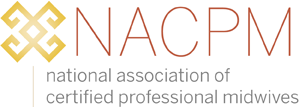We’re thrilled to announce the results of the 2025 NACPM Board of Directors election. Please join us in congratulating and warmly welcoming our newest and returning leaders.
These new board leaders will join the NACPM leadership team at our meeting this October in Austin. We look forward to working together in service of equitable, community-rooted midwifery, and we thank them for their commitment to our profession and the families we serve.
We’re also pleased to share that the Standards for Practice as a Certified Professional Midwife were approved by member vote on September 7, 2025. We are grateful to everyone who contributed to drafting, reviewing, and voting to affirm these standards.
Thank you to every member who voted and helped shape the future of our profession.
Wicanhpi Iyotan Win Autumn Cavender (Upper Sioux Reservation)
Autumn Cavender is a midwife, writer, artist, and activist from the Upper Sioux Reservation (Pezihutazizi K'api Makoce). Beginning birth work in 2008 at age 17, she has served as a doula, full-spectrum doula trainer, childbirth educator, and midwifery trainer. A respected lecturer, Autumn advocates for midwifery, traditional Indigenous birth practice, and Indigenous language revitalization. She serves on the South Dakota Board of CPMs, the Minnesota Midwives’ Guild, and the North American Registry of Midwives provisional board. Currently a Bush Fellow exploring the intersection of medical practice and metaphysics, she is based on her home reservation, where she lives with her two children, partner, a German Shepherd, and the occasional chicken.
Binta Niang, LM (Washington)
Binta Niang is a licensed midwife, educator, and community health advocate based in Seattle. Founder of Blessed Hands Midwives and adjunct faculty at Bastyr University, she has led maternal-child health and early learning programs serving immigrant, refugee, and underserved families. Multilingual in French, English, and Bambara, Binta brings over a decade of experience in healthcare leadership, program development, and culturally responsive care. Her work centers equity, birth justice, and building supportive pathways for midwifery students and new graduates to enter and thrive in the profession.
Melissa Chong, CPM (Hawaii)
Melissa Chong is a passionate advocate for integrating the CPM credential, at its fullest scope, into all systems of care. She brings experience in both birth-center and homebirth practices, along with policy work and familiarity with federal-level health structures. Melissa volunteers actively to advance integration, equitable access, and full-scope utilization of CPM skills, with a focus on reducing barriers that drive provider attrition and limit long-term practice. Her work centers collaboration across settings so CPMs can contribute fully to safe, community-based perinatal care.
Sakina O’Uhuru, RN, CNM, MS, CPM (North Carolina)
Sakina O’Uhuru has practiced the art of midwifery for more than 25 years and has provided maternal-child health care in underserved communities for over 30. She was the first African American Site Director/Director of Midwifery Services at Morris Heights Women’s Health & Birthing Pavilion (1999–2004), the first NYC clinic to offer out-of-hospital prenatal, labor, and delivery services in an underserved community. A clinical preceptor for SUNY Downstate, Stony Brook, Columbia, and NYU, Sakina founded Gentle Spirit Home Birth Midwifery Services and has served well over 1,000 families. She founded the nonprofit A Woman’s Way (2013) and A Wombman’s Way Warrior Midwife Training Program (2020; pending MEAC). Her publications include Journey to Birth (2013). She currently practices in Charlotte, NC.
Meredith Bowden was also re-elected to the Board this year. We’re grateful for her ongoing service and steady leadership.
Note on Marinah Farrell: Marinah was elected by NACPM members in this cycle. After the election, she graciously declined the seat due to unexpected significant, time-sensitive commitments at Phoenix Allies for Community Health, the free clinic she co-founded. We honor her service and are grateful for her continued leadership in the broader movement.

